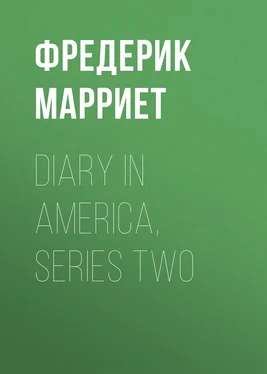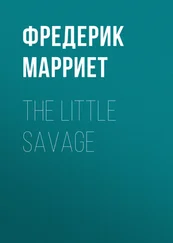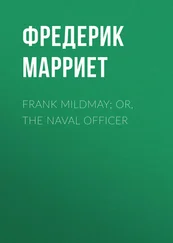Фредерик Марриет - Diary in America, Series Two
Здесь есть возможность читать онлайн «Фредерик Марриет - Diary in America, Series Two» — ознакомительный отрывок электронной книги совершенно бесплатно, а после прочтения отрывка купить полную версию. В некоторых случаях можно слушать аудио, скачать через торрент в формате fb2 и присутствует краткое содержание. Жанр: Путешествия и география, История, literature_19, foreign_edu, foreign_antique, foreign_prose, на английском языке. Описание произведения, (предисловие) а так же отзывы посетителей доступны на портале библиотеки ЛибКат.
- Название:Diary in America, Series Two
- Автор:
- Жанр:
- Год:неизвестен
- ISBN:нет данных
- Рейтинг книги:3 / 5. Голосов: 1
-
Избранное:Добавить в избранное
- Отзывы:
-
Ваша оценка:
- 60
- 1
- 2
- 3
- 4
- 5
Diary in America, Series Two: краткое содержание, описание и аннотация
Предлагаем к чтению аннотацию, описание, краткое содержание или предисловие (зависит от того, что написал сам автор книги «Diary in America, Series Two»). Если вы не нашли необходимую информацию о книге — напишите в комментариях, мы постараемся отыскать её.
Diary in America, Series Two — читать онлайн ознакомительный отрывок
Ниже представлен текст книги, разбитый по страницам. Система сохранения места последней прочитанной страницы, позволяет с удобством читать онлайн бесплатно книгу «Diary in America, Series Two», без необходимости каждый раз заново искать на чём Вы остановились. Поставьте закладку, и сможете в любой момент перейти на страницу, на которой закончили чтение.
Интервал:
Закладка:
Whatever society permits, people will do, and moreover, will not think that they are wrong in so doing. In England, had a person been guilty of a deliberate and odious lie, he would have been scouted from society, his best friends would have cut him; but how was this person treated for his conduct? When I showed Mr Clay’s letter, one said, “Well now, that was very wrong of A.”—Another, “I did not believe that A would have done so.”—A third, “that A ought to be ashamed of himself;” but they did not one of them, on account of this falsehood, think it necessary to avoid him. On the contrary, he was walking arm-in-arm with the men, dancing and flirting with the women just as before, although his slander, and the refutation of it, were both well known.
The reader will now perceive the great moral evil arising from this vice, which is, that it habituates people to falsehood. The lie of slander is the basest of all lies; and the practice of it, the most demoralising to the human heart. Those who will descend to such deliberate and malignant falsehood, will not scruple at any other description. The consequence is, that what the Americans have been so often taxed with, is but too prevalent, “a disregard to truth .”
To what must we ascribe the great prevalence of this demoralising habit in the United States? That the licentiousness of the press feeds it, it is true; but I am rather inclined to imagine that the real source of it is to be found in the peculiarity of their institutions. Under a democracy, there are but two means by which a man can rise above his fellows—wealth and character; and when all are equal, and each is struggling to rise above the other, it is to the principle that if you cannot rise above another by your own merit, you can at least so far equalise your condition by pulling him down to your own level, that this inordinate appetite for defamation must be ascribed. It is a state of ungenerous warfare, arising from there being no gradation, no scale, no discipline, if I may use the term, in society. Every one asserts his equality, and at the same time wishes to rise above his fellows; and society is in a state of perpetual and disgraceful scuffle. Mr Tocqueville says, “There exists in the human heart a depraved taste for equality, which impels the weak to attempt to lower the powerful to their own level, and induces men to prefer equality in slavery to inequality with freedom.”
In politics, especially, character becomes of much more importance than wealth, and if a man in public life can once be rendered odious, or be made suspected, he loses his supporters, and there is one antagonist removed in the race for pre-eminence. Such is one of the lamentable defects arising from a democratical form of Government. How different from England, and the settled nations of the old world, where it may be said that everything and everybody is, comparatively speaking, in his place!
Although many will, and may justifiably, attempt to rise beyond his circumstances and birth, still there is order and regularity; each party knows the precise round in the ladder on which he stands, and the majority are content with their position.
It is lamentable to observe how many bad feelings, how many evil passions, are constantly in a state of activity from this unfortunate chaotical want of gradation and discipline, where all would be first, and every one considers himself as good as his neighbour.
The above-mentioned author observes—“The surface of American society is, if I may use the expression, covered with a layer of democracy, from beneath which the aristocratic colours sometimes peep.”
In a moral sense, this is also true, the nobler virtues which are chiefly produced in the fertile field of aristocracy do occasionally appear; but the whole surface is covered with a layer of democracy, which like the lava which the volcano continually belches forth, has gradually poured down, and reduced the country round it to barrenness and sterility. 11 11 This chapter was in the press, when a paragraph, cut out of the Baltimore Chronicle, was received from an anonymous hand at New York. Whether with a friendly intention or otherwise, I am equally obliged to the party, as it enables me to further prove, if it were necessary, the vituperation of the American press. “Many persons in our country had an opportunity of becoming acquainted with the Captain. The fast-anchored isle never gave birth to a more unmitigated blackguard . His awkward, unwieldy misshapen body, was but a fair lodging for a low, depraved, licentious soul. Although liberally educated, he seemed insensible to any other enjoyments than those of sense. No human being could in his desires or habits approach more near to the animal than him. No gentleman ever sat down with him an hour without a sensation of loathing and disgust. ‘What kind of man is Captain Marryat?’ was once asked in our presence of a distinguished member of Congress, who had sojourned with him at the White Sulphur Springs. ‘He is no man at all,’ was the reply, ‘he is a beast.’” This is really “going the whole hog” himself, and making me go it too. Now, if I receive such abuse for my first three volumes, in which I went into little or no analysis, what am I to expect for those which are about to appear? To the editor of the Baltimore Chronicle I feel indebted: but I suspect that the respectable portion of the American community will be very much annoyed at my thus giving his remarks more extensive circulation than he anticipated.
Volume One—Chapter Seven
The best specimens of American writing are to be found in their political articles, which are, generally speaking, clear, argumentative, and well arranged. The President’s annual message is always masterly in composition, although disgraced by its servile adulation of the majority. If we were to judge of the degrees of enlightenment of the two countries, America and England, by the President’s message and the King’s speech, we should be left immeasurably in the back-ground—the message, generally speaking, being a model of composition, while the speech is but too often a farrago of bad English. This is very strange, as those who concoct the speech are of usually much higher classical attainments than those who write the message. The only way to account for it, is, that in the attempt to condense the speech, they pare and pare away till the sense of it is almost gone; his Majesty’s ministers perfectly understanding what they mean themselves, but forgetting that it is necessary that others should do the same. But in almost all branches of literature the Americans have no cause to be displeased with the labours of their writers, considering that they have the disadvantage of America looking almost entirely to the teeming press of England for their regular supply, and nowhere in that country can be said at present to be men of leisure and able to devote themselves to the pursuit. An author by profession would gain but a sorry livelihood in the United States, unless he happened to be as deservedly successful as Washington Irving or Cooper. He not only has to compete against the best English authors, but as almost all the English works are published without any sum being paid for the copyright, it is evident that he must sell his work at a higher price if he is to obtain any profit. An English work of fiction, for instance, is sold at a dollar and a quarter, while an American one costs two dollars.
This circumstance would alone break down the American literature if it were not for the generosity of England in granting their authors a copyright in this country; indeed, the American public pay that tacit compliment to us that they will hardly look at a work by one of their own citizens, until it has first been published in England, and received the stamp of approbation. Those American authors who have obtained a reputation look, therefore chiefly to the English copyright for remuneration; and if it were not for this liberality on our part, the American literature would not receive sufficient support from its own country to make it worth the while of any one to engage in it. The number of English works republished in America is very great, but the number of each work sold is much smaller than people here imagined.
Читать дальшеИнтервал:
Закладка:
Похожие книги на «Diary in America, Series Two»
Представляем Вашему вниманию похожие книги на «Diary in America, Series Two» списком для выбора. Мы отобрали схожую по названию и смыслу литературу в надежде предоставить читателям больше вариантов отыскать новые, интересные, ещё непрочитанные произведения.
Обсуждение, отзывы о книге «Diary in America, Series Two» и просто собственные мнения читателей. Оставьте ваши комментарии, напишите, что Вы думаете о произведении, его смысле или главных героях. Укажите что конкретно понравилось, а что нет, и почему Вы так считаете.












